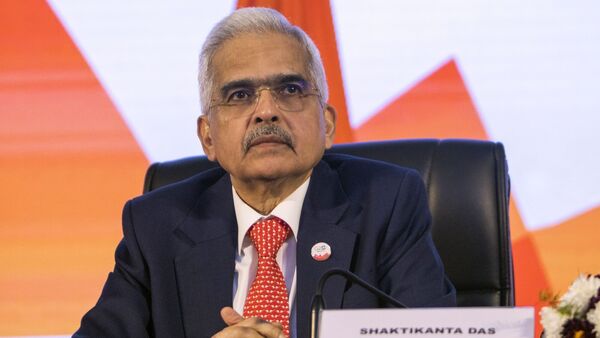The Reserve Bank of India’s Monetary Policy Committee (MPC) surprised many on Thursday with an unexpected pause on the repo rate after six hikes in a row since May 2022. The consensus among monetary-policy observers in the run up to the first MPC meeting this financial year was that it would go with a 25-basis-points hike.
While announcing the decision to keep the repo rate unchanged at 6.5%, RBI governor Shaktikanta Das said the MPC’s decision was for “this meeting only”. It’s a pause, not a pivot, he emphasised. The unanimous vote for keeping the rate unchanged cannot, therefore, at this stage be interpreted as the end of the rate-hike cycle, and depending on how inflation shapes up, further rate hikes cannot be ruled out.
Although Das stressed that the RBI’s “fight against inflation isn’t over” as inflation hasn’t yet returned to the target level of 4%, the pause seems puzzling and premature. More so as the MPC does not expect that it will succeed in reducing inflation to 4% any time soon. It expects inflation to remain fairly above target this year.
The MPC’s rationale for the pause is that it wants to assess the impact of the 250 bps cumulative rate hikes over the past 11 months. It will obviously watch the impact of the US Federal Reserve’s slowing of rate hikes in view of the ongoing banking stress, volatility and concerns about financial stability in global markets.
All this was known to economists and other watchers of monetary policy. The consensus had emerged for a 25 bps hike after the softening seen in the consumer price inflation rate two months ago proved to be transitory. In February it was at 6.4%. Core inflation was also above the maximum tolerance level prescribed for CPI inflation.
Economists and market players that were vocally arguing for a 25 bps hike are now praising the pause, but the question that emerges is: would a 25 bps hike have made the MPC overshoot its inflation target of 4%?
The MPC in fact increased its gross domestic product (GDP) growth projection for 2023-24 from 6.4% to 6.5% and lowered the projection for retail inflation from 5.3% earlier to 5.2% in 2023-24. Although within the tolerance band, this would still be far above the target level of 4%.
This leads to another question worth asking: is the MPC actually driven by the legal mandate to rein in inflationary pressures in India, or is the central bank giving undue weightage to considerations outside its legal mandate, such as maintaining the least possible interest rate differential with the Fed’s policy rate? That has implications for dollar outflows from the country and, therefore, the rupee-dollar exchange rate, making it a bigger political and electoral consideration than retail inflation in the current context.
Last year, the RBI had swerved into monetary tightening in an off-schedule meeting. It was not via a well-telegraphed, frictionless transition. No new data on the Indian economy had surfaced. The RBI’s timing was dictated by the Fed’s well-anticipated interest rate hike. Later, the RBI tried to gloss over the cause for the eleventh-hour change by saying it was shifting focus to fighting inflation.
But it is no secret that the shift was triggered not by a sudden concern for growth-retarding inflation but pressure from New Delhi to defend the rupee by preventing the interest rate differential with the US from narrowing. This would have expedited the outflow of dollar investments, putting the rupee under pressure.
Central banks certainly have the option to take unexpected decisions. This is not to suggest that they must be predictable at all times. But the fact remains that the RBI has allowed inflation to stray far from the target level over prolonged durations in recent times. This raises doubts about its commitment to the inflation mandate.
The MPC’s decision to pause rate hikes doesn’t inspire confidence in the RBI’s commitment to the fight against inflation. The fact that the RBI – like its counterparts in other countries, including advanced economies – has consistently and spectacularly failed to assess the strength and durability of inflationary pressures doesn’t enhance its credibility.
Download The Mint News App to get Daily Market Updates.
More
Less
#RBIs #unexpected #pause #doesnt #inspire #confidence #fight #inflation
